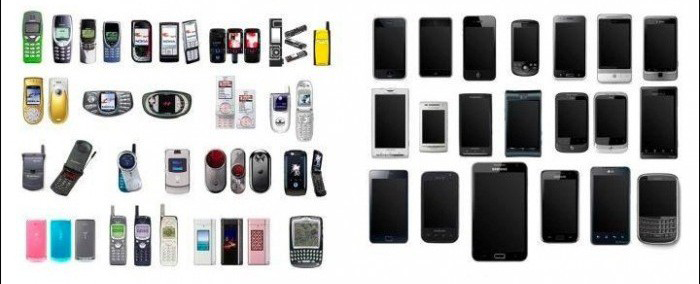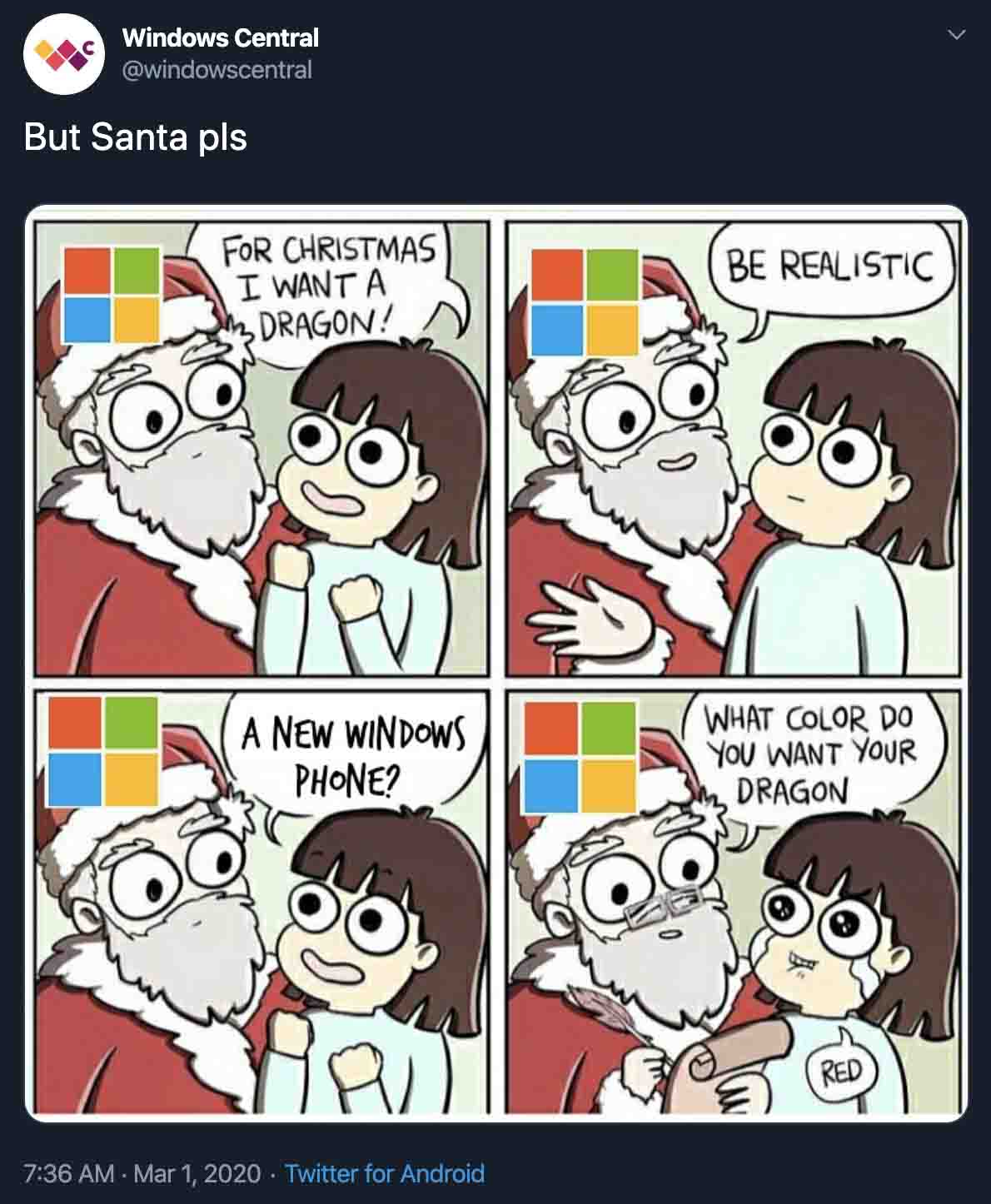Which Phones I've Used and Why
The story of how I was an iPhone, Windows Phone and an Android user at different times.
March 01, 2020 - 15 min read
Technologies Used: iOS, Windows Phone, Android
I've always been interested into electronics. However, there is one device that got me more excited than anything else. The iPhone. When it came out, there was nothing like it on the market. An iPod, a phone, an internet communicator. Just by looking at the image below (credit: Josh Helfferich), we can see what before and after the iPhone looks like:

My mom was the first person in the family to get an iPhone. She had a 3GS. I've spent many hours playing with it. The touchscreen felt just right. It responded back to your every tap and swipe. People thought pinch to zoom gesture was something only possible in movies. Being able to roll a ball on the screen by just tilting your phone was truly magical. During that time, I had a Nokia XpressMusic 5800. It was a good phone yes, but not a smartphone next to the iPhone.
One year later, I finally convinced my parents to get me an iPhone. My first iPhone was an iPhone 4. I got it a month after it was launched. The screen was beautiful. It was fast, responsive and overall a magical experience. People agreed that it was magical indeed. Apple started earning truckloads of money.
The industry was aware of Apple's success. Blackberry and Nokia were trying to catch up but they were too far behind. I remember noticing the first Android phones on the market in 2010. They were all terrible compared to an iPhone. Using an Android phone back then felt like they asked the engineering team to make a normal phone first, then retrofit a touchscreen. Oh and there was Windows Mobile 6 and the HTC HD2 Leo. Let's just not talk about that.
One year later, the Galaxy S2 came out. It wasn't great, but this time, the developer community was adopting the platform. I remember playing with a Galaxy S2 for the first time. Yes it was fine, and you could install cool new ROMs and improve the experience by a lot if you were tech savvy enough. It wasn't the best choice for normal users, unless you were on a budget.
Couple years later Nokia tried very hard for the last time. The Lumia 920. I got interested in this device because Microsoft was behind the project. I knew some C# and wanted to become a mobile developer. Plus, I have always been the type of person that wanted to try the latest gadgets. Lumia 920 was new and a bold enough move that it got me thinking. I got a Lumia 920 and started making apps for it. When I first started using it, it felt very inferior to an iPhone, but that was ok because I truly believed Microsoft will make this device amazing. Well, they closed the Windows Phone division. Nokia gave Microsoft the best hardware on the market and Microsoft murdered it. We don't know if it was bad mangement, or the competition being too strong or something else. Whatever happened, it made Microsoft shut down the project.

About 10 months later, I switched to a Galaxy S4. "Why not an iPhone?" you're gonna ask. I wanted to get a device which was not an iPhone 4. After the iPhone 4, very little has changed until the iPhone 6. I already knew what an iPhone feels like. I wanted to try something different, and the Galaxy S4 was the first time when I felt Android was ready to become a valid competitor against the iPhone.
Using a Galaxy S4 was still an inferior experience to using an iPhone, but I felt like the extra features compensated for the compromised experience. To this date, proper file management is Android's biggest win against the iPhone. Being an Android user in 2014 made me realize that the S4 was a pocket computer and iPhone was a smartphone. The choice was getting more and more difficult by the day. I feel like this time Apple felt the pressure. Big screens were becoming more and more attractive. Apple had to respond back. The competition was finally catching up.
Enter the iPhone 6 with a bigger screen. After I got into university, I got an iPhone 6+. I wanted to see what Apple has been working on since the last 3 years. It was not a pocket computer like Android. Sending an email attachment was a broken experience. Sharing files between your laptop and your smartphone was too difficult. iTunes never worked properly. However, all of your apps worked exactly as you would expect them to work. The big touch-screen was responsive, battery life was great, software updates were frequent, apps were feature-complete. The best part was, there was one single built-in mail app that worked with all of my mail accounts (it was great when you didn't have to send email attachments).
I used my iPhone 6+ until 2018. Throughout all those years, I never had to change the battery. It travelled to many places with me, has got me through university. It got better with every software update. I still remember the moment when I received a phone call on my MacBook when Apple rolled out the continuity feature. It was again, magical.
In 2018, I felt like it was time for an upgrade. However, Apple was stagnating again. They were essentially selling the same iPhone 6 with different names (6s, 7). When they announced the iPhone 8 and iPhone X (for $1000), I felt personally offended. iPhone X was basically still an iPhone 6 with a glorified screen. There was no good reason for me to buy it when my iPhone 6 was still working great. Then something grabbed my attention: the Galaxy S8.
After graduating uni, I got a Galaxy S8. I wanted to see how much of an improvement Google was able to make to the Android experience. And wow... It was amazing. The screen was great, proper file management was there and email attachments were real. Best part? USB-C. One day, I tried plugging my 2TB 2.5" external hard drive to my phone via a USB-C dongle. I wasn't expecting it to work, but it showed up in the file manager on the phone. I was able to copy my pictures directly into my hard drive without requiring a laptop. That was a killer feature. Then I realized I could just plug in my GoPro, and move my footage directly onto my phone without setting up a slow and annoying Wi-FI connection. Android was just undoubtedly better in many ways. Making a choice between an iPhone vs Android phone was very difficult.
Android was getting better. All of the apps that I've used were in feature parity with their iOS counterpart. Companies have started treating Android users the same as iOS users. Then one year later, I got the Galaxy S10. I mainly purchased it because of the Wide-Angle camera lens. It is a very good phone, and I would recommend it. I've used it until I've published this blog post. Read more below.
During my time with the S8 and the S10 some of my friends/colleagues have asked me why I prefer Android. I wasn't able to give them a definitive answer about why I prefer one over the other. Some people say they don't like Apple as a company, some people say they're used to Android, some others say they don't like paying too much money for a phone, and the list goes on. I don't care about any of those. It is time to decide once more: Will I choose a pocket computer with a proper file manager or a nice user experience. And I want to find a definitive answer: Why one over the other?
Today, I got an iPhone XS Max. I know, it's the last year's model but just like the iPhone 6, Apple's packaging the same device and selling it as an iPhone 11 Pro. Yes I would like to have the wide angle camera but a $400 price difference cannot be justified. Not because I can't afford it, but I'd rather donate that money to someone who needs it to get better education, treatment etc.
On an ending note, I feel like I should mention this: I'm one of the very few people in this world who has done professional iOS, Android and Windows Phone app development at some point in their careers. This is a blog post about the user experience, not the developer experience.
Moral of the story is:
Sometimes one is not undoubtedly better than the other.
Be open for change and keep trying different things.